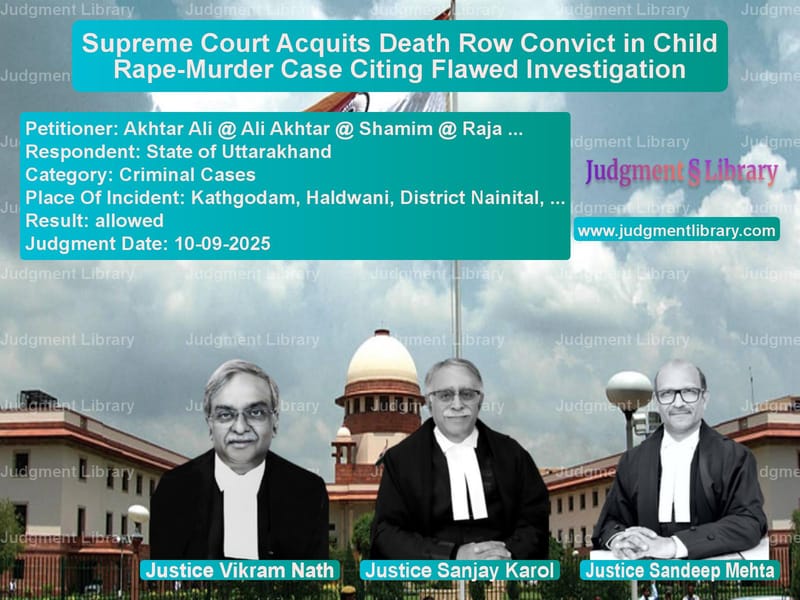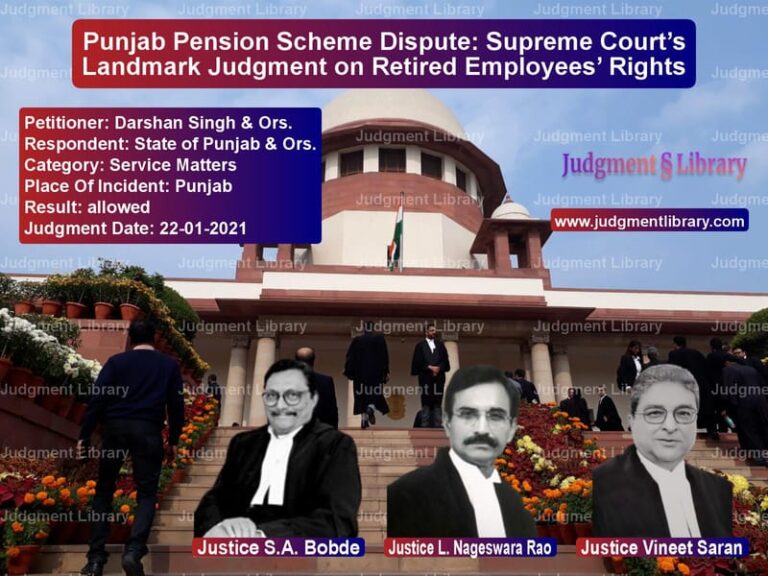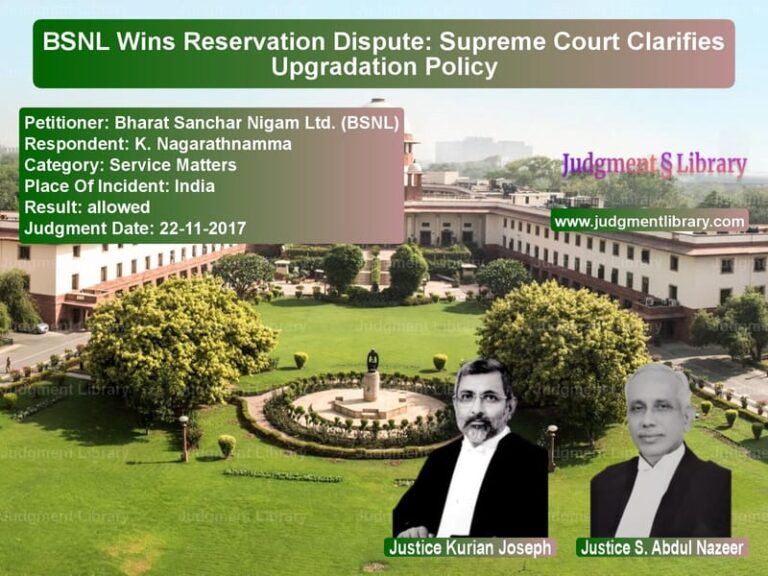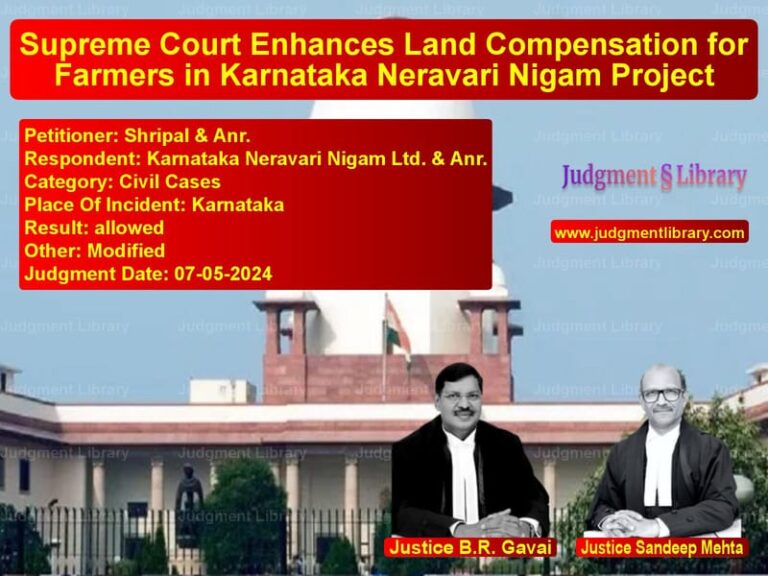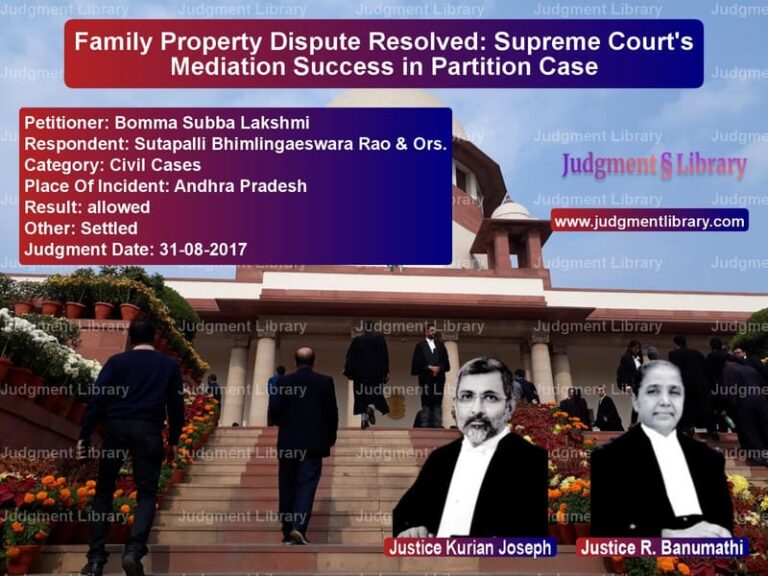Supreme Court Acquits Death Row Convict in Child Rape-Murder Case Citing Flawed Investigation
In a landmark judgment that highlights the critical importance of proper investigation and forensic procedures in capital cases, the Supreme Court of India has acquitted two men who were convicted and sentenced to death for the brutal rape and murder of a minor girl. The case involved Akhtar Ali and Prem Pal Verma, who were accused of kidnapping, sexually assaulting, and killing a young girl during a wedding function in Uttarakhand in 2014.
The tragic incident occurred on November 20, 2014, when the victim, a young girl identified as Ms. K, went missing from a wedding ceremony at Sheeshmahal in Ramlila Maidan, Kathgodam. Her body was discovered four days later near the Gaula River forest, with post-mortem examination revealing she had died from shock and hemorrhage resulting from injuries to her vaginal and perianal region caused by sexual assault.
The Legal Battle
The trial court convicted Akhtar Ali under multiple sections including 376A (rape), 363 (kidnapping), and 302 (murder) of the Indian Penal Code, along with provisions of the Protection of Children from Sexual Offences (POCSO) Act, and sentenced him to death. Prem Pal Verma was convicted under Section 212 (harboring offender) of IPC. The Uttarakhand High Court upheld the convictions and death sentence, leading to the appeals before the Supreme Court.
Arguments Presented
The appellants’ counsel, Ms. Manisha Bhandari, raised several critical arguments challenging the prosecution’s case. She contended that “the entire prosecution case is based on circumstantial evidence, the chain of which remains incomplete and shattered as the material evidence has been fabricated, and gotten up witnesses were deliberately introduced by the prosecution, to bolster its case.”
Specific arguments included that “the prosecution failed to examine one of the most material witnesses, namely, the cousin of the victim girl, Nikhil Chand.” and that “the DNA report, on which the conviction of the accused-appellant No.1-Akhtar Ali primarily rests, is neither consistent nor reliable.”
The defense also challenged the arrest procedure, arguing that “the arrest of the accused-appellant No.1-Akhtar Ali, from Ludhiana on 27th November 2014, is also surrounded by grave doubt.”
The State, represented by Ms. Vanshaja Shukla, vehemently defended the convictions, arguing that “the scientific and DNA evidence conclusively establishes the involvement of accused-appellant No.1-Akhtar Ali, in the crime, leaving no room for doubt.” and that “the conduct of the accused-appellant No.1-Akhtar Ali before and after the incident supports the prosecution’s case and conclusively establishes his involvement in the crime.”
Supreme Court’s Scrutiny of Evidence
The Supreme Court bench comprising Justices Vikram Nath, Sanjay Karol, and Sandeep Mehta conducted a meticulous examination of the evidence and identified multiple fatal flaws in the prosecution’s case.
Regarding the motive, the Court found that “the prosecution utterly failed to attribute any clear or convincing motive to the accused-appellant No. 1-Akhar Ali.”
On the ‘last seen’ theory, the Court noted that “the belated introduction of these witnesses, all purporting to speak to the same fact after a lapse of five days, gives rise to a legitimate apprehension that the ‘last seen’ circumstance was subsequently manufactured to bolster the prosecution’s case.”
The Court expressed grave concern about the investigation’s failure to examine Nikhil Chand, the victim’s cousin who first informed police about the body’s location. The judgment stated: “The utter failure of the Investigating Officer to question Nikhil Chand so as to find out the source of his knowledge about the dead body of the victim girl depicts gravely tainted and suspicious actions of the Investigating agencies.”
Forensic Evidence Under Scanner
The DNA evidence, which formed the cornerstone of the prosecution’s case, came under intense scrutiny. The Court found serious inconsistencies, noting that “the total lack of traces of semen in the vaginal samples makes the presence of DNA of the accused-appellant No.1-Akhtar Ali, in the cervical swab suspicious.”
The judgment further observed: “It is inconceivable that semen was found in the swab but was completely absent in the smear slides, since both the samples were collected simultaneously from the same anatomical site in the cervix of the dead body of the victim girl. The presence in one and absence in the other defies scientific probability and undermines the credibility of the prosecution’s reliance on the DNA report.”
The Court also raised doubts about the qualifications of the DNA expert, Dr. Manoj Kumar Agarwal, noting that “his qualifications are M.Sc. in Botany and Ph.D., which apparently do not equip him with expertise in the field of human DNA profiling.”
Arrest Procedure Questioned
The Supreme Court found the arrest procedure of Akhtar Ali highly suspicious. The judgment stated: “On a plain reading of the evidence of the witness (PW-10), we find many suspicious circumstances surrounding the theory of apprehension and arrest of the accused-appellant No.1-Akhtar Ali.”
The Court noted that “the story regarding the Call Details Records is dubious and suspicious” and that “the very theory advanced by the prosecution, that accused-appellant No. 1-Akhtar Ali was traced based on his mobile location, is rendered false and without foundation.”
Legal Principles Applied
The Court reiterated the established legal principles for cases based on circumstantial evidence, quoting from Sharad Birdhichand Sharda v. State of Maharashtra: “the circumstances from which the conclusion of guilt is to be drawn should be fully established… the facts so established should be consistent only with the hypothesis of the guilt of the accused… the circumstances should be of a conclusive nature and tendency… they should exclude every possible hypothesis except the one to be proved… there must be a chain of evidence so complete as not to leave any reasonable ground for the conclusion consistent with the innocence of the accused.”
Regarding capital punishment, the Court emphasized that “the irreversible nature of capital punishment demands that it be imposed only in the ‘rarest of rare’ cases… and only when the prosecution has led unimpeachable, cogent, and convincing evidence that excludes every hypothesis of innocence.”
Final Ruling
After comprehensive analysis, the Supreme Court concluded: “Having considered the evidence in its entirety and bearing in mind the principles governing cases resting purely on circumstantial evidence, we are of the opinion that the prosecution has failed to establish the complete and unbroken chain of circumstances necessary to bring home the guilt of the accused-appellants.”
The Court allowed the appeals, set aside the convictions, and acquitted both appellants. The judgment directed: “The accused-appellants are acquitted of all charges. They shall be released forthwith, if not required in any other case.”
This judgment serves as a powerful reminder of the fundamental legal principle that in criminal cases, particularly those involving capital punishment, the prosecution must prove its case beyond reasonable doubt through reliable and credible evidence. The Court’s meticulous examination of investigative procedures and forensic evidence underscores the importance of maintaining the highest standards in criminal investigations to prevent miscarriages of justice.
Petitioner Name: Akhtar Ali @ Ali Akhtar @ Shamim @ Raja Ustad and Prem Pal Verma.Respondent Name: State of Uttarakhand.Judgment By: Justice Vikram Nath, Justice Sanjay Karol, Justice Sandeep Mehta.Place Of Incident: Kathgodam, Haldwani, District Nainital, Uttarakhand.Judgment Date: 10-09-2025.Result: allowed.
Don’t miss out on the full details! Download the complete judgment in PDF format below and gain valuable insights instantly!
Download Judgment: akhtar-ali-@-ali-akh-vs-state-of-uttarakhand-supreme-court-of-india-judgment-dated-10-09-2025.pdf
Directly Download Judgment: Directly download this Judgment
See all petitions in Murder Cases
See all petitions in Rape Cases
See all petitions in Judgment by Vikram Nath
See all petitions in Judgment by Sanjay Karol
See all petitions in Judgment by Sandeep Mehta
See all petitions in allowed
See all petitions in supreme court of India judgments September 2025
See all petitions in 2025 judgments
See all posts in Criminal Cases Category
See all allowed petitions in Criminal Cases Category
See all Dismissed petitions in Criminal Cases Category
See all partially allowed petitions in Criminal Cases Category

